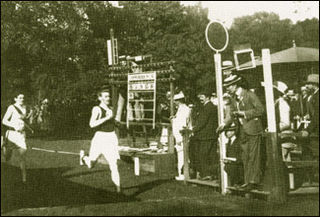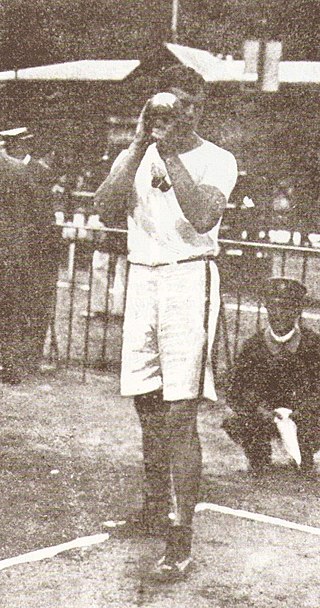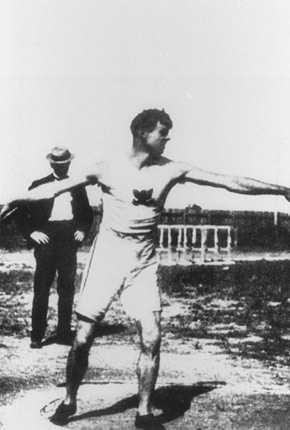
At the 1900 Summer Olympics, twenty-three athletics events were contested. Altogether, 117 athletes from 15 nations competed. A total of 68 medals were awarded. In many countries, due in part to the conflation of the Olympic Games and the World's Fair in Paris, the media discussed only the athletics events under the "Olympic" name while ignoring the incredible variety of other sports featured at the time.

The men's 200 metres was a sprinting event on the athletics programme at the 1900 Summer Olympics in Paris. It was held on July 22, 1900, well after most of the rest of the athletics events. The 1900 Games were the first time the 200 metres was contested. The races were held on a track of 500 metres in circumference. Eight athletes from seven nations competed. The event was won by Walter Tewksbury of the United States. Norman Pritchard of India took silver while Australian Stan Rowley earned bronze.

The men's 800 metres was middle-distance running event on the athletics programme at the 1900 Summer Olympics in Paris. It was held on July 14 and July 16, 1900. The races were held on a track of 500 metres in circumference. 18 athletes from seven nations competed. The event was won by Alfred Tysoe of Great Britain, the nation's first medal in the event. The United States also won its first medals in the 800 metres, with silver and bronze.

The men's 1500 metres was a middle-distance running event on the athletics programme at the 1900 Summer Olympics in Paris. It was held on July 15, 1900. The race was held on a track of 500 metres in circumference. Nine athletes from six nations competed. The event was won by Charles Bennett of Great Britain, the nation's first medal in the brief history of the event.

The men's 110 metres hurdles was the first of the track and field events on the athletics programme at the 1900 Summer Olympics in Paris. It was held on July 14, 1900. Nine athletes from three nations competed in the shortest of the hurdling events. The event was won by Alvin Kraenzlein of the United States, the second of five consecutive victories for the nation in the first five Olympic Games. It was also the first of four consecutive podium sweeps for the Americans in the event.

The men's 400 metres hurdles was a track & field athletics event at the 1900 Summer Olympics in Paris. This event was held for the first time at the Olympics. The competition took part on July 14 and July 15, 1900. The race was held on a track of 500 metres in circumference. Five athletes from four nations competed in the longest of the three hurdling events. The event was won by Walter Tewksbury of the United States. Henri Tauzin of France earned silver, while George Orton of Canada took bronze.

The men's high jump was a track & field athletics event at the 1900 Summer Olympics in Paris. It was held on July 15, 1900. Eight athletes from seven nations competed in the high jump. The event was won by Irving Baxter of the United States, the nation's second consecutive victory in the men's high jump. Great Britain and Hungary each took medals in their first appearance in the event.

The men's pole vault was a track & field athletics event at the 1900 Summer Olympics in Paris. It was held on July 15, 1900. Eight athletes from five nations competed in the pole vault.

The men's long jump was a track & field athletics event at the 1900 Summer Olympics in Paris. It was held on July 14 and July 15, 1900. 12 athletes from six nations competed. The event was won by Alvin Kraenzlein of the United States, the second consecutive victory for the American team. Myer Prinstein, also an American, took silver. Patrick Leahy, an Irish athlete competing for Great Britain, took bronze; it was the first long jump medal for a non-American athlete as the United States had swept the 1896 medals.

The men's triple jump was a track & field athletics event at the 1900 Summer Olympics in Paris. It was held on July 16, 1900. 13 athletes from six nations competed. The event was won by Myer Prinstein of the United States, the nation's second consecutive victory in the men's triple jump. Prinstein became the first, and through the 2016 Games, only, person to have won both the long jump and the triple jump. James Brendan Connolly took second, making him the first man to medal twice in the triple jump. Lewis Sheldon finished third, completing what would later be known as a medal sweep.

The men's shot put was a track & field athletics event at the 1900 Summer Olympics in Paris. It was held on July 14 and July 15, 1900. 11 shot putters from five nations competed. The event was won by Richard Sheldon of the United States, the nation's second consecutive victory in the men's shot put. Josiah McCracken took silver and Robert Garrett took bronze, completing an American medal sweep.

The men's discus throw was a track & field athletics event at the 1900 Summer Olympics in Paris. It was held on July 14 and July 15, 1900. 17 discus throwers from nine nations competed. The event was won by Rudolf Bauer of Hungary, the nation's first victory in the men's discus throw. František Janda-Suk gave Bohemia its first medal in the event, also in that nation's first appearance. Richard Sheldon's bronze put the United States in the top three for the second consecutive Games.

The men's discus throw was one of six throwing events on the Athletics at the 1908 Summer Olympics programme in London. The competition was held on 16 July 1908. 42 throwers from eleven nations competed. NOCs could enter up to 12 athletes. The event was won by Martin Sheridan of the United States, his second consecutive victory in the event. The Americans completed their first sweep in the discus throw, with Merritt Giffin taking silver and Bill Horr bronze.

The men's hammer throw was one of six throwing events on the Athletics at the 1908 Summer Olympics programme in London. The competition was held on July 14, 1908. 19 throwers from eight nations competed. NOCs could enter up to 12 athletes. The event was won by American John Flanagan, his third consecutive victory in the event. He was the first man to win three medals in the hammer throw and, as of the 2016 Games, the only one to win three gold medals in the event. The silver medal went to fellow American Matt McGrath. Con Walsh of Canada took bronze and became the first athlete not from the United States to win a medal in the event, as the Americans had swept the podium in both 1900 and 1904. The three medalists were all part of the Irish Whales.

The men's discus throw was a track and field athletics event held as part of the Athletics at the 1904 Summer Olympics programme. It was the third time the event was held. The competition was held on Saturday, September 3, 1904. Six athletes from two nations competed.

The men's hammer throw was a track and field athletics event held as part of the Athletics at the 1904 Summer Olympics programme. It was the second time the event was held. The competition was held on Monday, August 29, 1904. Six athletes from the United States competed. John Flanagan, the reigning champion, defended his gold medal and set a new Olympic record. John DeWitt took silver and Ralph Rose bronze. It was the second consecutive medal sweep for the United States in the event. Flanagan was the first man to earn multiple medals in the event; he would finish with three consecutive victories, a record not matched by anyone in the hammer throw.

The men's 56 pound weight throw was a track and field athletics event held as part of the Athletics at the 1904 Summer Olympics programme. It was the first time the event was held. It would not appear on the Olympic program again until the 1920 Summer Olympics, which would be the last time the 56 pound weight was thrown in the Olympic Games. The competition was held on September 1, 1904. 6 athletes from 2 nations competed. The event was won by Étienne Desmarteau of Canada, one of only two gold medals in athletics won by an athlete not from the United States. Americans John Flanagan and James Mitchel took second and third, respectively.

The men's hammer throw was a track and field athletics event held as part of the athletics at the 1912 Summer Olympics programme. It was the fourth appearance of the event, which had been won all three previous times by John Flanagan. The competition was held on Sunday, July 14, 1912. Fourteen hammer throwers from four nations competed. NOCs could enter up to 12 athletes. The event was won by Matt McGrath of the United States, the nation's fourth consecutive victory in the event. McGrath was the second man to earn multiple medals in the hammer throw. Duncan Gillis of Canada took silver. Clarence Childs of the United States finished third for bronze.

The men's hammer throw event was part of the track and field athletics programme at the 1924 Summer Olympics. The competition was held on Thursday, July 10, 1924. 15 hammer throwers from ten nations competed. The maximum number of athletes per nation was 4. The event was won by Fred Tootell of the United States, the nation's sixth consecutive victory in the event; the Americans would not win again until 1956. Tootell was the first of the winners to have been born in the United States; the previous winners had all been Irish-American. Fellow American Matt McGrath, the 1908 silver medalist and 1912 champion, took silver once again; he was the second man to earn three medals in the hammer throw. Malcolm Nokes earned Great Britain's first medal in the event with his bronze.

The men's hammer throw event was part of the track and field athletics programme at the 1936 Summer Olympics. The competition took place on August 3, 1936, with 27 competitors from 16 nations. The maximum number of athletes per nation had been set at 3 since the 1930 Olympic Congress. The final was won by Karl Hein of Germany. The silver medal went to Erwin Blask, also of Germany. They were the first medals for Germany in the event; Germany was also the first country other than the United States to have two medalists in the event in the same Games. Fred Warngård of Sweden took bronze. The United States' eight-Games medal streak in the hammer throw was snapped, with the Americans' best result being William Rowe's fifth place.



















